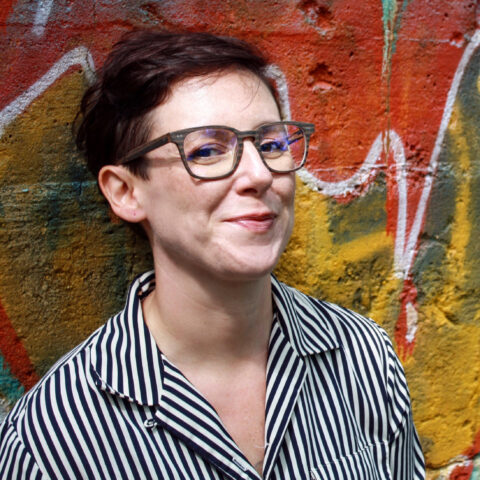What inspired you to write this story?
Grappling with a history of what felt like inescapable abuse and recurring patterns in my other relationships where I felt similarly powerless. This past year, a comet reappeared in my sky to stalk me relentlessly. I felt incredibly helpless, as if the world would blow apart. In many ways, it did. I reevaluated every relationship against the way that abuse had terraformed me. But every time I wrote through these ideas in creative nonfiction to process my experience, the result was just awful: too bare and brutal. Fiction gave me breathing room to play, like the swell of an atmospheric layer. Ultimately, “sweat trails” allowed me to articulate something much scarier about those unhealthy relationship dynamics: the pleasure and magic of them, how being stalked by a magnetic-destructive force often feels like being chased across the universe by something beautiful and loving.
Why the comet allegory? Is the comet’s destruction inevitable?
Comets are a force of nature, drawing every eye with their hypnotic energy. Everyone looks up, points, oohs and aahs, and forgets about impending doom, like some shared delusion. I loved the people who crossed my boundaries with my whole heart. If you’ve been in this sort of toxic dynamic, you’ll know it’s completely overwhelming, often isolating, because no one else sees the damage inflicted (except, perhaps, your personal astropsychiatrist. Of course, I’m also drawing on the current climate change crisis here and the stubborn resistance against listening to our scientists.) To everyone else, your comet is incredibly fascinating, and often, the earthly target will question themselves against that sweatless comet-charisma. “sweat trails” is about group-think as much as anything. So, yes, the comet hits here. The damage has real impact. I won’t say that destruction is inevitable, though. I’m not demonizing comets here, especially because the word narcissist has been deflated and overused of late. I’m just interested in engaging conversation around this dynamic and how we enter these sorts of relationships. I’m dismantling a culture of comet-worship.
Are there any stories or pieces of art that your micro is in conversation with?
I actually wrote this in conversation with a creative nonfiction piece that I published some time ago, which thinks through depression as a crater on Venus. That piece shows the real-world repercussions of “sweat trails”: here’s what happened when that comet hit me and the deep grooves it wore into the surface of my life. The two pieces work as a before-and-after.
What draws you to the night sky?
Possibility. When I write, I love constraints and designing rules for myself to follow. But once I’m situated inside that rule-set, a full universe expands inside those walls. In other words, even if I cannot control my safety here on Earth from an approaching comet, I can still look up. Unfortunately, I remain a hopeful optimist.



 The core workshop of SmokeLong Fitness is all in writing, so you can take part from anywhere at anytime. We are excited about creating a supportive, consistent and structured environment for flash writers to work on their craft in a community. We are thrilled and proud to say that our workshop participants have won, placed, or been listed in every major flash competition. Community works.
The core workshop of SmokeLong Fitness is all in writing, so you can take part from anywhere at anytime. We are excited about creating a supportive, consistent and structured environment for flash writers to work on their craft in a community. We are thrilled and proud to say that our workshop participants have won, placed, or been listed in every major flash competition. Community works.